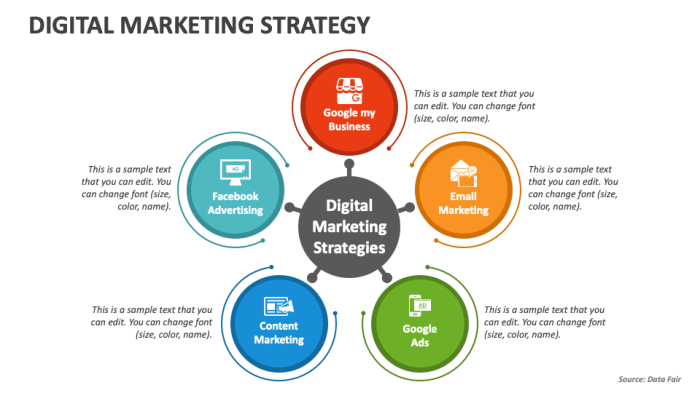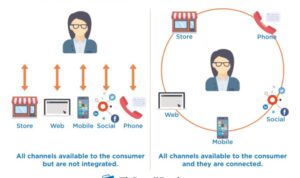Digital Marketing Strategy sets the stage for businesses to thrive in the online realm, encompassing key elements that drive success and growth. From identifying target audiences to optimizing campaigns, this strategy is the backbone of modern marketing.
Overview of Digital Marketing Strategy
In the world of digital marketing, having a solid strategy is like having the ultimate cheat code to success. A digital marketing strategy is basically a plan of action that helps businesses leverage digital channels such as social media, email, websites, and search engines to reach their target audience and achieve their marketing goals.
Importance of Having a Well-Defined Digital Marketing Strategy
A well-defined digital marketing strategy is crucial for businesses of all sizes. It helps them to stay ahead of the competition, reach a larger audience, increase brand awareness, and ultimately drive more sales. Without a clear strategy in place, businesses risk wasting time and money on ineffective marketing tactics that don’t deliver results.
- One prime example of a business that has successfully implemented a digital marketing strategy is Nike. Through their innovative use of social media, influencer partnerships, and targeted advertising, Nike has managed to dominate the athletic apparel market and connect with consumers on a global scale.
- Another great example is Coca-Cola, which has utilized digital marketing strategies to engage with customers, create personalized experiences, and strengthen brand loyalty. Their campaigns, such as the “Share a Coke” campaign, have gone viral and generated immense buzz around the world.
- Lastly, Amazon has revolutionized digital marketing with their data-driven approach, personalized recommendations, and seamless shopping experience. By analyzing customer behavior and leveraging technology, Amazon has become a powerhouse in e-commerce and set the benchmark for digital marketing excellence.
Key Components of a Digital Marketing Strategy

In the realm of digital marketing, there are several key components that are essential for creating a successful strategy. These elements work together to help businesses reach their target audience and achieve their marketing goals.
Target Audience Analysis
Understanding your target audience is crucial in developing a digital marketing strategy. By conducting thorough research and analysis, businesses can gain insights into the demographics, behaviors, and preferences of their potential customers. This information allows marketers to tailor their messaging and content to resonate with their audience, ultimately driving engagement and conversions.
Setting Clear Objectives and KPIs
Setting clear objectives and key performance indicators (KPIs) is vital for measuring the success of a digital marketing strategy. Objectives provide a roadmap for what the business aims to achieve, whether it’s increasing brand awareness, generating leads, or driving sales. KPIs, on the other hand, help track and evaluate the performance of specific metrics to ensure that the strategy is on track to meet its goals.
Effective Channels in Digital Marketing Strategy
When it comes to digital marketing strategy, choosing the right channels can make or break your campaign. Let’s dive into the different digital marketing channels and their pros and cons.
Social Media
Social media platforms like Facebook, Instagram, and Twitter are great for building brand awareness and engaging with your audience in real-time. However, the main disadvantage is that it can be challenging to measure ROI effectively. A successful campaign on social media would be Wendy’s witty Twitter responses that went viral and increased brand awareness.
Email Marketing
Email marketing is a cost-effective way to reach your target audience directly. The advantage is that you can personalize content and track metrics easily. On the downside, email can get lost in crowded inboxes. An excellent example of a successful email marketing campaign is Airbnb’s personalized recommendations based on user behavior.
(Search Engine Optimization)
is crucial for driving organic traffic to your website and improving search engine rankings. The advantage is that it’s a long-term strategy with lasting results. However, it can take time to see significant improvements. A successful campaign is HubSpot’s comprehensive content strategy that ranks high for relevant s.
PPC (Pay-Per-Click) Advertising
PPC ads, like Google AdWords, allow you to target specific s and demographics for immediate results. The disadvantage is that it can be costly if not managed correctly. A successful PPC campaign example is Nike’s targeted ads during major sporting events like the Olympics.
Data Analysis and Optimization in Digital Marketing Strategy

When it comes to digital marketing, data analysis plays a crucial role in evaluating the performance of a strategy. By analyzing data, marketers can gain valuable insights into the effectiveness of their campaigns and make informed decisions to optimize future efforts.
Using Data Analytics Tools to Optimize Campaigns, Digital Marketing Strategy
Data analytics tools are essential for optimizing digital marketing campaigns. These tools allow marketers to track key performance indicators (KPIs), monitor campaign progress in real-time, and identify areas for improvement. By leveraging data analytics, marketers can make data-driven decisions to enhance targeting, messaging, and overall campaign performance.
Best Practices for A/B Testing and Continuous Improvement
- Conduct A/B tests: A/B testing involves comparing two versions of a marketing asset (such as an email, landing page, or ad) to determine which performs better. By testing different variables and analyzing the results, marketers can optimize their campaigns for maximum effectiveness.
- Set clear goals: Before conducting A/B tests or making any changes to a campaign, it’s crucial to establish clear goals and objectives. This will help ensure that the data analysis is focused and the optimization efforts are aligned with the overall marketing strategy.
- Iterate and refine: Continuous improvement is key to success in digital marketing. Marketers should regularly review campaign performance, analyze data, and implement changes based on insights gained. By iterating and refining their strategies, marketers can continuously optimize their campaigns for better results.












